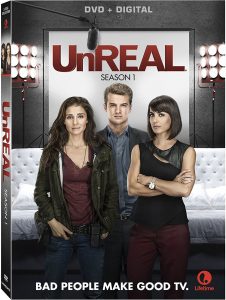To be honest, the only reason I set my DVR for the first episode of “UnReal” (9 p.m. Central Mondays on Lifetime) is that Shiri Appleby stars in it. If I were to pretend to be deeper than that, I could say I’m intrigued that it’s a rare role for Shiri where she doesn’t play the sweetheart or lovably troubled young adult. (She did a nice job as the bad girl in the short-lived “Six Degrees,” but I mainly think of her roles as the likable lead in “Roswell,” “Life Unexpected” and “Dating Rules from My Future Self.”)
Appleby does indeed play a bad girl of sorts in “UnReal,” but everyone – save perhaps the put-upon intern Madison, and the down-to-earth contestant Faith – is a nasty person on this series about what goes on behind the camera on a reality show in the vein of “The Bachelor” (called “Everlasting”). Appleby’s Rachel is actually the least bad of the bunch because she knows her job is immoral and disgusting. As the contestant handler, she is tasked with talking to the women as if she’s a trustworthy confidante, but she’s really manipulating the contestants’ emotions for the sake of the cameras.
So why doesn’t Rachel quit? Well, Rachel interrupted filming during the previous season of “Everlasting” by going on an epic rant about how “this job is Satan’s asshole.” She then totaled a company car and got a DUI. But the rant led to a fight between the bachelor and a contestant that resulted in juicy footage and boffo ratings, so the crew is happy to have her back. And Rachel has to come back lest the company press charges for damage to the car; producer Quinn (Constance Zimmer) also has the connections to make the DUI go away.
“UnReal” is executive produced by Marti Noxon, Joss Whedon’s second-in-command on “Buffy,” and Sarah Gertrude Shapiro, who worked on “The Bachelor.” All the characters, but particularly Quinn, talk in a rapid-fire fashion like they’re on an Aaron Sorkin show. The difference is that for all the huge egos of Sorkin’s characters, they tend to skew likable (I think of Matthew Perry and Bradley Whitford on the underrated “Studio 60 on the Sunset Strip,” also a behind-the-scenes-of-a-TV-show series). Quinn is detestable, as she preconceives each contestant as fitting a role (“villain,” “sympathetic loser,” etc.). Quinn doesn’t even have the decency to let those roles come out naturally through the contestants’ personalities.
The victims of Quinn’s and Rachel’s manipulations are not sympathetic, either. Britney (Arielle Kebbel, another “Life Unexpected” veteran) spits on Rachel after Rachel uses the fact of Britney being an orphan to manipulate her into showing emotions on camera. But when you think about it, people who sign up to be on reality shows don’t tend to inspire sympathy: They are trying to gain something for their own career’s sake and have at least a cursory (but more likely savvy) understanding of how reality shows manipulate people. “Playing along” is intrinsic in the agreement contestants make, so it’s hard to believe they can be truly surprised and hurt by the crassness of the production process.
It’s an open secret that reality shows are the most artificial form of TV and that a significant degree of phoniness is part and parcel to the genre. That having been said, I wonder if the open cruelty displayed by Quinn and the necessary-to-do-her-job cruelty performed by Rachel are reflective of how things really go on a show like “The Bachelor.” Shapiro would be the one to ask. But I’m guessing “UnReal” heightens the reality of how “The Bachelor” is made just as “The Bachelor” – through judicious editing as well as the manipulations outlined on “UnReal” – heightens the reality of how people interact. I make this guess because it would be exhausting to maintain Quinn’s level of meanness 24/7.
I suppose there’s an appeal in some circles (perhaps dating-show fandom) to shows where every character is vicious or phony. But personally, I’d like more of these characters to behave like believable, halfway decent human beings. The short-lived “L.A. Complex” hit that sweet spot: Each of the series’ Hollywood dreamers was a self-promoter, yet they were all worth rooting for. If “UnReal” finds a similar balance, it will feel less like a second-rate Aaron Sorkin knockoff and more like a fun addition to the fast-talking primetime soap genre.


